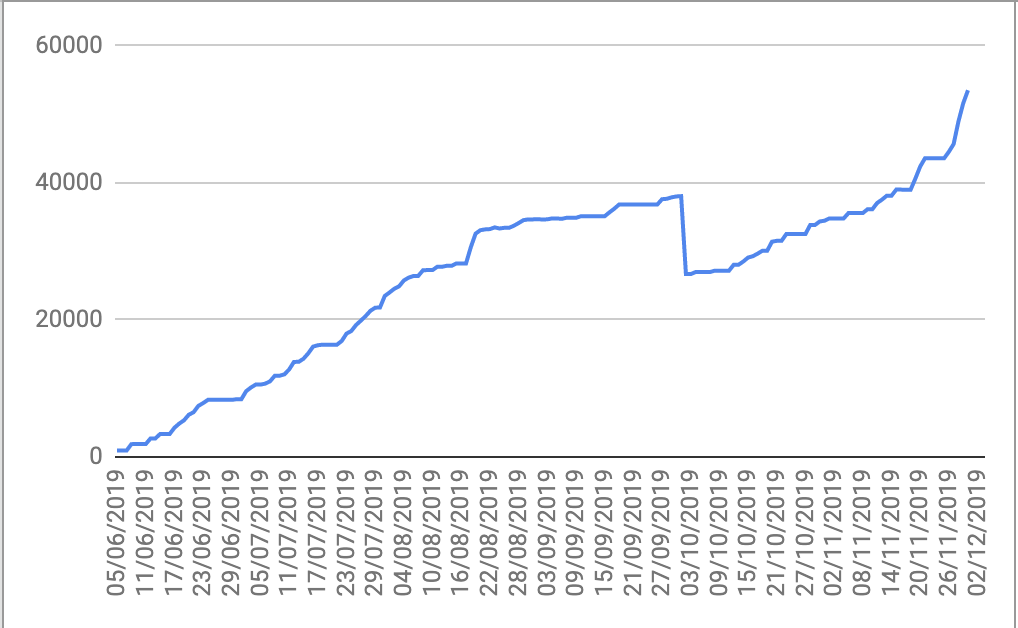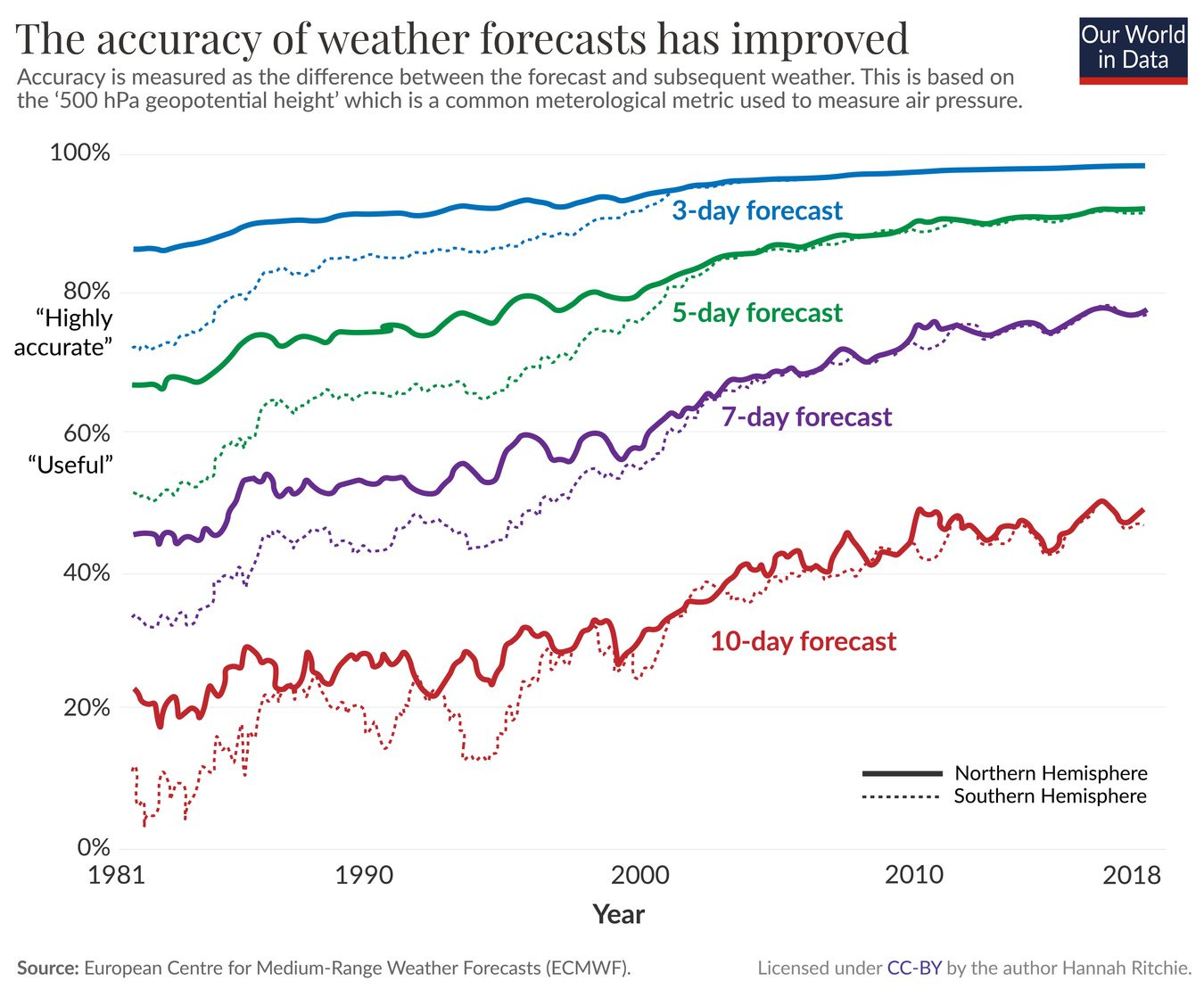On Being Prolific
Also: NYC's The Torch, Better Weather Forecasting, and Hans Zimmer
When you create, you can’t help but notice how much others create. In announcing a leatherbound edition of one of his books, Brandon Sanderson recently surprised others by dropping a new secret project.
He’s a profoundly prolific writer, writing 300,000 words per year and able to churn out 3 - 5 books. On average, it’s about ~820 words per day, but given that editing and other commitments are likely, he usually attempts ~2,000 words per day when he is actively writing. For context, for NaNoWrimo, you need to clock about ~1,700 words per day to write a short novel (around 50,000 words) in a month.
It’s astonishing that he is able to do this consistently. Big enough of a force to bend Audible into more favourable terms for authors. The Taylor Swift of writing. I started working on a new novel in June last year and this week I finally came to a first draft of act 1 that I’m really proud of. The reality is, the writing was on and off as I was dealing with wedding planning, art projects, and other admin in the latter half of last year. It feels longer than I had hoped.
When I looked at my first novel, however, I wrote the first full draft in 6 months.
I know why I was able to do that. Partly because I was naive to the writing process, but primarily because I followed the same advice as Hugh Howey (of WOOL fame). It took him 20 years to write his first book, and eventually learned that the best habit is to write every day. He often got in his own way.
In a similar vein, Prince, often regarded as one of the most prolific musicians would go to a studio *after* shows. He was always creating.
In 2019, writing my first novel, I wrote everywhere: whether it was a plane, a hotel room, or at home. At least a sentence a day I told myself. In part, because the book writes itself even when you aren’t actively writing. It’s being written on walks, in showers, and when you wake up the next morning with a better way to phrase something you struggled with the previous night. With my latest novel, there was longer breaks in between and it meant that to get into the world of writing, I had re-load the context back into the rest of my life. Not just when I was sitting in front of the computer and writing. But when I was making breakfast, walking to the shops, and watching TV: always hovering like a mini-map. In other words, to get back to writing required me to ramp up into it. To understand where I was and what I imagined for the story and the characters.
And in this, I also interrogated my response to Jonathan Glazer. When I was catching up on the Oscar Best Pictures last week (while sick), I noticed that Jonathan Glazer (who wrote and directed Zone of Interest), has 10 year gaps between his films.
I felt a sense of relief, but then realised that this was the wrong (and actually awful) response. Jonathan is not un-prolific.
But I understand that it can look like that. No matter how much you create, it is still frustrating to pair the effort required with the productive output. Spending hours on a coding bug to only result in two lines of code change is frustrating. To write one scene in a week because you had to spend hours thinking and rethinking it. The reality is, is that the productive process is always the tip of the iceberg.
80% of creating is often what looks unproductive.
And so, I had to remind myself. Being prolific is not about productivity, it’s about being able to stay inside the context of creation. When creators advise you to write every day, it’s not really about the act of writing itself, but it’s about keeping you inside the process. Once you exit, it takes time and effort to come back in. Whatever you are creating is its own muscle that you need to keep trained and warm.
Bonus Content!
Came out of covid this week and glad to be back and healthy. It unfortunately meant that I chose to postpone my half-marathon I was planning for (this weekend). Bit sad and having FOMO, but there will be more races. I don’t want to hurt/damage myself unnecessarily.
I also watched Dune: Part 2 this week. So amazing in so many ways. Peak cinema. Happy about that!
Also, as I mentioned, feeling quite proud of finally getting a draft of act 1 of my new novel that I feel proud of. Took a lot of revisioning and rethinking.
The Torch
New renderings have been release for the supertall skyscraper going up at 740 Eight Avenue in Manhattan. Dubbed, The Torch. It’s getting a lot of polarized opinions.
Honestly, while there’s been reasonable critique about the value of New York City’s supertalls, I really prefer more imaginative buildings as an everyday way to inspire. We do NOT need more cookie cutter homogenous glass boxes that make you feel like every downtown is the same downtown. So, I’m all for this. In addition, I hope to see more imaginative architecture not just for supertalls, but everyday housing across the world.
Things like Freddy Mamani’s New Andean architecture.
Weather Forecasting Is Better
An improvement that we take for granted: weather forecasting has gotten quite better.
It’s interesting how Southern Hemisphere forecasting only got up to par around mid 2000’s.
Optical Narrowing To Reduce Speeds
I thought this was a smart and simple way to reduce speeds in a neighbourhood. Just draw lines that make it feel like it’s narrower than it is.
I do wonder if it might be the case in this instance that adding more parking might also be the reason for the slower driving, simply because more people parking results in naturally slower speeds. But, I’ll give it the benefit of the doubt.
Protocol Entrepreneurship
If I wasn’t writing a new novel, I would enjoy applying for the Protocol Improvement Grants as part of the Summer of Protocols program. They are looking for applicants!
The core of it is what we’re calling Protocol Improvement Grants (PIGs): 90k for a team of two to work on improving a real world protocol (any kind, technological, social, organizational) over 4 months. We will be awarding 5 PIGs. We anticipate this is going to be tough because we’re trying to catalyze a new category of entrepreneurship: Protocol entrepreneurship. It exists in the wild of course, but naming and characterizing a wild pattern of behavior is often the first step to consciously cultivating it as a learnable capability that can be refined and systematically made more powerful.
Hans Zimmer - Kiss The Ring
Yes, I might be listening to the Dune soundtrack on repeat this week. What a stellar and magical piece of music.
Let it float you along like the spice and sand blows through Arrakis.
Hope you get to see a beautiful sunset this week, friends.
See you next week!
Simon








